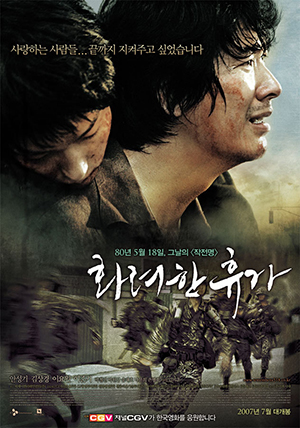May 18, 1980 was the day of the Gwangju Democratization Movement, which will be remembered for a long time in the history of Korea. The movement occurred when President Park Chung-hee was assassinated on October 26, 1979 and after the Revitalizing Reforms system ended. President Chun Doo-hwan disrupted the people's demand for a democratic government and expanded the emergency martial law (martial law: an order to guard a certain place with troops) on a national scale in May 1980. Today, this article will introduce the significance of the democratic movement that this historical background contains and the films "Taxi Driver" and "Fancy Vacation" that represent the movement.
When the government was replaced, the government tried to suppress the people’s desire for democracy. The suppression by the government caused the citizens to rise up in protest. The scale of the protests by Gwangju citizens gradually grew and on May 21, 1980, the government fired live rounds at civilians, breaking the promise to retire airborne troops. In response, the citizens of Gwangju occupied the armory to form a civilian. As citizens refused to surrender, the government attempted to "press play" and misreported Gwangju. At the same time, the government isolated the citizens of Gwangju by cutting off all means of transportation and communication in Gwangju. Starting with the Gwangju blockade, a massacre of citizens occurred. The official death count released by the government is 144 civilians, 22 soldiers, and 4 police officers, but the true death count is estimated to be several times higher than that. Although the May 18 Gwangju Democratization Movement failed, it is a movement that has great significance in today's democracy because of the protesters’ dedication and sacrifice.
The first movie to show this historical event realistically is 'Taxi Driver'. Man-seop, who works as a taxi driver in Seoul, heads to Gwangju with Peter, a German journalist who came to Korea to cover Gwangju. When they arrive in Gwangju they face a completely different reality from news reported outside of Gwangju. Man-seop fights against the cruel attacks of soldiers for the democratization of Korea, for the Gwangju and for Peter. After completing the coverage despite the difficulties, Peter returns to his position and reports to the media by correcting the coverage of the situation in Gwangju, which was misreported in other regions and other countries. These corrections inform the world of the harsh situation faced by Gwangju citizens. The film is meaningful in that it is based on a true story of a relationship between a taxi driver and a German reporter. The story partially unfolds from the perspective of people in other regions. Even though it was not a conflict related to them, Man-seop and Peter fought at the risk of their own lives. This is one of the reasons why they should be remembered for a long time as fighters for the democratic movement.
The second movie is 'Fancy Vacation'. In May 1980, brothers Min-woo and Jin-woo live normal lives in Gwangju. On a peaceful day, innocent citizens are suddenly beaten to death by armed soldiers. So they get together to form a civilian army and start a 10-day struggle. Their struggle for the freedom of democracy and their own freedom was driven by the need to protect their loved ones. The film makes the viewer rethink the meaning of democracy.
Unlike the first movie, this movie unfolds from the perspective of Gwangju citizens. Viewers can understand more about the violence that took place in the Gwangju Democratization Movement after watching the film. Characters in the film fight to the end for a democracy. Despite all the desperation, there is still the little light of hope.
These movies give viewers a chance to once again think about and remember the May 18 Gwangju Democratization Movement, which should never be forgotten. People who have never experienced the movement should make the effort to learn some meaningful history and remember it for a long time. People who have lived and experienced those days are said to be able to share the pain caused by that time through these films, and to bring back their memories that they had forgotten. The 40th anniversary of the May 18 Gwangju Democratization Movement has already passed. At this point, everyone must remember their admirable sacrifice for democracy once again.
 |
| ▲ Poster for the movie ‘Taxi Driver’. |
 |
| ▲ Poster for the movie 'Fancy Vacation'. |
By Jo Soo-bin, cub-reporter hyun185415@naver.com
<저작권자 © The Campus Journal, 무단 전재 및 재배포 금지>

 Shrinkflation, Consumer Deception
Shrinkflation, Consumer Deception




